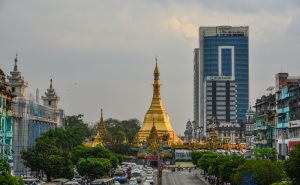Myanmar’s military administration has invited the Association of Southeast Asian Nations (ASEAN) to send a team to observe its planned elections in December and January, according to Malaysia, the bloc’s current chair.
In a statement on Saturday, the Malaysian Foreign Ministry said that the invitation was relayed during talks between Foreign Minister Mohamad Hasan and junta chief Senior Gen. Min Aung Hlaing in Naypyidaw on October 9.
“The foreign minister noted the invitation extended to ASEAN member states to send election observers. For Malaysia, the invitation was addressed to Malaysia’s Election Commission,” the ministry said. It added that the Southeast Asian bloc will discuss the request during a regional summit later this month.
Hasan’s visit to Myanmar, which he undertook in his capacity as ASEAN’s special envoy on Myanmar, was intended to support the implementation of the bloc’s Five-Point Consensus peace plan. First announced in April 2021, two months after the military’s overthrow of Aung San Suu Kyi’s civilian government, the plan appointed a regional special envoy for Myanmar and called for an immediate cessation of violence and inclusive dialogue involving “all parties” to the country’s conflict.
During last week’s talks, Malaysia’s Foreign Ministry said, Hasan reiterated the bloc’s call for the implementation of the Consensus. Hasan also “urged for the cessation of attacks on civilians and civilian infrastructures, for the declaration of ceasefires, and for the channeling of humanitarian assistance to those in need, without restrictions.”
The military regime’s planned election formed a large part of the discussion. The polls are scheduled to be held in several phases beginning on December 28, with the aim of transitioning power to a quasi-civilian government. Given the political situation in much of the country, the election has been widely criticized as a ploy to enshrine the military’s rule behind a civilian façade. The election has been preceded by junta offensives designed to recapture territory lost to ethnic armed groups and other resistance organizations, which rights groups say have involved the intensification of indiscriminate air attacks on resistance-controlled villages.
Even ASEAN has been critical of the junta’s relentless election push. During a meeting in January, the bloc’s foreign ministers warned Myanmar’s military regime that it should prioritize peace over an election planned for later this year, saying that the latter must “involve all stakeholders.” “We told them the election is not our priority. Our priority is to stop the violence,” Hasan told the media after the meeting.
However, with the Myanmar military seemingly unmoved by ASEAN’s admonition, the bloc has fallen back on calls to ensure that the election is at least free, fair, and inclusive. During his meeting with Min Aung Hlaing last week, Hasan told Min Aung Hlaing that the elections “must be conducted in accordance with the principles of free, fair, transparent, and credible processes.” He also “underlined that elections should be held throughout the country with the participation of all political parties and stakeholders.”
Neither of these things is likely to eventuate. Despite some recent territorial gains, the Myanmar military is not in control of large parts of the country, particularly in Rakhine, Shan, Karen, Chin, Kachin, and Karenni states, as well as in Sagaing and Magwe regions. In those areas where it does hold sway, moreover, it has tightly circumscribed the process in order to ensure that its own proxies prevail. Major opposition parties such as the National League for Democracy, which won the 2015 and 2020 elections in a landslide, have been deregistered and will not take part.
In July, the military junta added a new clause to Section 12(a) of the Political Parties Registration Law, stating that a political party can lose its registration if the Union Election Commission deems it to have “cheated” or done something illegal during the election. At the same time, the junta enacted a new law holding out harsh punishments, including the death penalty, for anyone opposing or disrupting the elections.
Clearly, any government that is formed after the election will be unrepresentative and viewed as illegitimate to a large segment of Myanmar society. ASEAN’s leaders now have to decide whether to send teams to observe an election that will clearly fall short of the bloc’s own professed standards. The reactive pragmatism with which it has responded to the Myanmar conflict since the coup of 2021 gives every indication that it will accept the election as a fait accompli, and attempt to continue its push toward peace within the junta’s new terms of engagement.





























